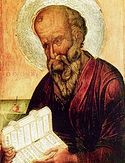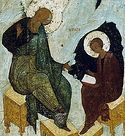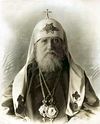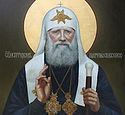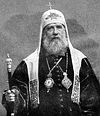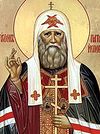

| Previous day | Next day |
| Old Style
September 26
|
Sunday |
New Style
October 9
|
| 16th Sunday after Pentecost. Tone 7. | Fast-free period.
|
![]() Repose of the Holy Apostle and Evangelist John the Theologian (начало 2nd c.).
Repose of the Holy Apostle and Evangelist John the Theologian (начало 2nd c.). ![]() Glorification of New Hiero-confessor Tikhon (Bellavin), patriarch of Moscow and all Russia (Glorification, 1989).
Glorification of New Hiero-confessor Tikhon (Bellavin), patriarch of Moscow and all Russia (Glorification, 1989).
Righteous Gideon, judge of Israel (ca. 1307 b.c.). St. Ephraim, founder of Perekom Monastery (Novgorod) (1492).
St. Nilus the Younger, of Rossano (Calabria) (1004). St. Neagoe Basarab, prince of Wallachia (1521).
Thoughts for Each Day of the Year
According to the Daily Church Readings from the Word of God
By St. Theophan the Recluse

Eighteenth Sunday After Pentecost. [II Cor. 9:6-11; Luke 5:1-11]
The fishermen toiled for an entire night and took nothing; but when the Lord entered their ship, and, after preaching commanded them to cast their net, they took so many that they could not pull them out and the net broke. This is an image for all work without God’s help, and for work with God’s help. When one person works, wanting to achieve something through his strength alone—he is all thumbs. When the Lord draws near to him, then one good thing after another flows in from somewhere. In the spiritual-moral sense the impossibility of success without the Lord is tangibly visible: Without Me ye can do nothing, said the Lord. And this law acts in all things. Just as a branch not grown onto a tree not only does not bear fruit, but dries up and loses its life as well, neither can people bring forth fruits of truth valuable for eternal life if they are not in living communion with the Lord. Any good that they might have is only an appearance of good, but in essence it is faulty—like a forest apple that appears red but if you taste it, it is sour. It is also tangibly clear in an external, worldly sense: one struggles and struggles, and all in vain. When God’s blessing descends, all comes out well. Those who are attentive toward themselves and the paths of life know these truths through experience.
The Sixteenth Sunday After Pentecost. [II Cor. 6:1-10; Matt. 25:14-30]
The parable about the talents offers the thought that life is a time for trading. That means that it is necessary to hasten to use this time as a person would hurry to a market to bargain for what he can. Even if one has only brought bast shoes, or only bast,[1] he does not sit with his arms folded, but contrives to call over buyers to sell what he has and then buy for himself what he needs. No one who has received life from the Lord can say that he does not have a single talent—everyone has something, and not just one thing; everyone, therefore, has something with which to trade and make a profit. Do not look around and calculate what others have received, but take a good look at yourself and determine more precisely what lies in you and what you can gain for that which you have, and then act according to this plan without laziness. At the Judgment you will not be asked why you did not gain ten talents if you had only one, and you will not even be asked why you gained only one talent on your one, but you will be told that you gained a talent, half a talent or a tenth of its worth. And the reward will not be because you received the talents, but because you gained. There will be nothing with which to justify yourself—not with nobleness, nor poverty, nor lack of education. When this is not given, there will be no question about it. But you had hands and feet. You will be asked, what did you gain with them? You had a tongue, what did you gain with it? In this way will the inequalities of earthly states be levelled out at God’s judgment.
[1] Very inexpensive, unsophisticated items.


